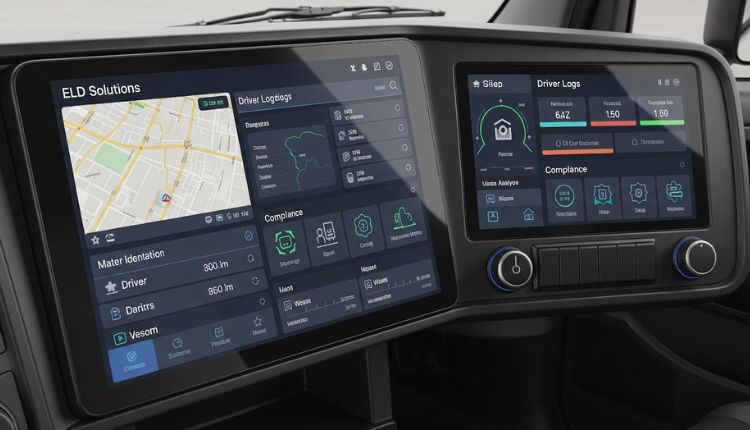The use of Electronic Logging Devices (ELDs) to keep your company compliant, improve safety, and improve operational efficiency is a necessity for any fleet. With dozens of vendors for ELD devices, finding a reliable ELD Provider can be a daunting task. Below is a detailed guide for fleets to consider when looking for the best operational partner for the long term.
Understanding What Makes an ELD Provider Reliable
A reliable ELD provider should have
Accurate logs and have no issues with hardware reliability and have no issues with service reliability The reliability of an ELD provider is more than the devices
Key Elements of Reliability
– FMCSA Certified platform
– Consistent device and service uptime
– Compliance and regulatory support and history
– Positive testimonial and customer review history
Must-Have Features in a Reliable ELD Solution


Not all ELD solutions have the same capacity. The most reliable ELD solutions offered are those that have built-in compliance and efficiency features.
Essential ELD Features
– Automated Electronic Logs.
Full compliance with all hours of service (HOS) logged in real time.
– Value Added Driver and Vehicle Tracking
Efficient route planning and immediate communication between driver and dispatcher.
– Electronic Driver Vehicle Inspection Reporting (DVIR) System.
Automated pre and post inspection to increase safety and eliminate time.
– User-friendly mobile app
Drivers should be able to use the app with little training.
– Secure data storage
Protect sensitive fleet data from breaches.
– Bluetooth or wired connectivity options
Ensures stable connection between the vehicle and the device.
Assessing the Quality of the Devices
Various device attributes will impact the trustworthiness of the ELD as well.
Some attributes to have include
– Rugged construction for sustained use
– Quick processing capability
– Reliable Bluetooth/wired connection
– Wide range of truck compatibility
– Quick installation within several minutes
Software Reliability: The Heart of a Good ELD
The user experience will largely depend on the software, even if the hardware is good.
EDL Software Features to Look For
– User-friendly for fleet managers and drivers
– Seamless automatic upgrades of the system
– Storage of logs in the cloud
– Ability to view logs effortlessly
– Instant notifications on compliance changes
Customer Support: A Major Element
Because ELD issues can cause roadside violations, good ELD providers will be responsive and helpful.
Support should ELD Provider all the following:
– 24/7 Availability
Support should be reachable any day or time of the week. No holidays or rotations should be implemented.
– Live Chat and Phone Support
There should be multiple contact mediums. Ideally, chat and call functionality would be available.
– Quick Trouble Resolution
Support should be eager to assist and be responsive.
– Customer Success Managers
Support should assign each contact to a single CSM to assist rather than to a singular chat or call.
– Quality of Support
Support should offer internal documentation, guides, and training.
Compliance and Security Considerations
Your ELD provider should prioritize the respective customer compliance and data protection.
Compliance Considerations
A provider should be able to provide documentation to confirm the following:
– Valid membership FMCSA listing
– Automated log backups on a schedule
– Events/changes to logs are captured and recorded
– System tampering is not possible
Data Security Considerations
A provider should ELD Provider documentation to confirm the following:
– Data is transferred following a secure protocol
– Data is stored in an authenticated and authorized cloud container
– Data security assessments are performed on a schedule and parts of the data clothing systems are tested for access
Transparency of Pricing and Contracts
Unexpected billing or unclear pricing for a provider of the ELD is a source profit drain.
Currency
– Monthly subscription
– Hardware (if applicable/valid/electronic)
– Contracts
– Replacement fee
– Extra fee for additions
Quick Check
– Cancellation notice period
– Cost to recover to a baseline (vs 5.1 and 7.1)
– Cost to replace (vs 5.1)
Other Fleet Walking Tools
Not every ELD is equally useful. Other fleets can share information on ELD useful for:
– IFTA reporting
– Dispatching
– Fuel management
– Maintenance
– Load board
Reviews and Testimonials
Review all testimonials and reviews. Other company fleets share a lot of information.
Customer reviews with cold weather
– Durability in cold weather conditions
– Service with little to no outages
– Service with no cold weather outages
– Assistance in events with no logs
– Service with fast response times to problems
Considerations when selecting ELDs
These questions help to determine the honesty of a vendor to a potential customer.
Key Questions
Is your ELD FMCSA-certified?
– What is your average downtime?
– Do you have a demo or trial?
– What is your average installation time?
– What is your response time to help requests?
– What is your replacement policy for defective units?
Conclusion: Key Takeaways
A reliable ELD provider combines dependable hardware, intuitive software, transparent pricing, and excellent customer support. Fleet owners should evaluate each provider based on compliance strength, ease of use, real-world performance, and long-term value. By taking a structured approach and asking the right questions, you can select an ELD solution that keeps your drivers compliant, your operations efficient, and your business ready for the future.






